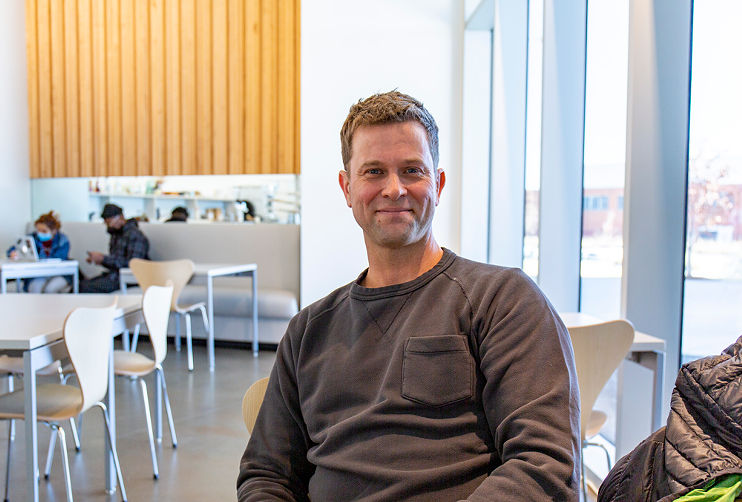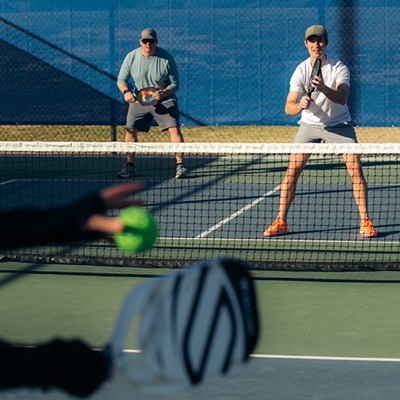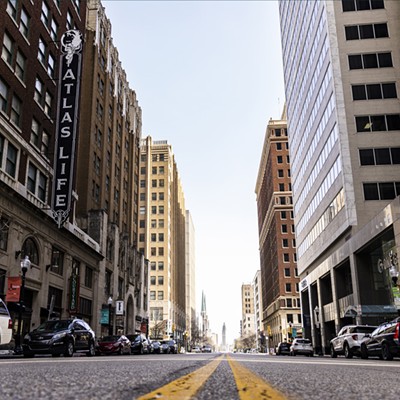Some people pay it forward because they want to — Ryan Cristelli pays it forward because he needs to. He can’t leave people cold. The founder of Project Winter Watch, Ryan provides warmth to some of Oklahoma City’s most vulnerable people.
When you visit the Project Winter Watch Facebook page, the incredible photography accompanied by powerful stories immediately grab your attention. The spontaneous sincerity of the work follows the vein of Humans of New York, a popular series of pics and anecdotes.
“I think maybe, almost subconsciously, it kind of skewed that way,” Cristelli said. “I’ve been a creative director for quite some time. When I first started to get involved in creating this project and being more involved around the homeless, I knew that part of the process would be to humanize our neighbors, and to talk about them in very honest terms. Obviously, there’s an activating idea that goes with that, but it was mainly just the need to know who they are. At first, I, like many others, just thought well, everyone needs someone to wash dishes or something. But then I started understanding the folks, and that isn’t the case. I started to understand more about what addiction does to the mind, that betrayal and mental illness. Folks that are escaping physical and sexual abuse, mental abuse, and they’re out there. One thing that doesn’t care about how they got there is the cold, it just doesn’t care. So one of the bigger parts of this project is communicating with and about these people. It’s a weird balance and there are tweaks, there’s things I have to hold back because it’s just too much. But, yes, Humans of New York is definitely a big inspiration in terms of sharing their stories.”
Project Winter Watch started as a calling after tragedy struck over a freezing Oklahoma City night.
“Most of my ideas started out as pure ignorance,” he said, smiling. “My wife Aley started Pine Pantry, these freestanding food pantries around town. At the time I didn’t have a really good understanding of our homeless population and what got them there. I also didn’t understand, I thought maybe, for my own betterment perhaps, that they just don’t have a place to go. So when I was going and stocking a shelf at the pantry, or putting a coat of stain on it, I started talking to these people and getting a better understanding of who they are. Asking questions of who they are, where they’re from, and then eventually of the ways they got to this point. This gave me a much better understanding of what’s going on and what their needs were. The real catalyst to the project came when my wife sent me an article about an abandoned house fire and four people that died in a single day off the highway near Remington Park. I just sat there with a couple bucks in my wallet and a tank of gas going, ‘This can’t be, this can’t be.’”
Not knowing where to start, Ryan enlisted the power of his network who quickly jumped to help.
“I texted a couple friends like, ‘Hey, I don’t know what I’m doing, but I’m going to Academy to buy some blankets or some sleeping bags. Would you guys be in for a couple bucks?’ Immediately here’s $10, $20, $50. So I went to the sale section in the back of the store and bought about $300 of sleeping bags. I bought the biggest ones I could get because the temperatures were going to be negative. I get all these sleeping bags, get out to the car and open the trunk and, I feel this overwhelming sense of accomplishment. And then pure dread. I don’t know what I’m doing. I don’t know where I’m going. Or what’s going to happen when I get there. I don’t know anything. Which is where a lot of folks find themselves — wanting to help but not knowing how to do it.”
Ryan put it to Facebook and soon had friends and connections from as far back as elementary school donating money, sleeping bags and other warm items. It opened the gates to what would become Project Winter Watch.
“That initial post raised a few bucks,” Cristelli said. “Then people that were involved in different community organizations invited me to see these encampments and what’s going on. That started the education about these people, our neighbors, what they face, why they’re out there, and as well as further education about products, what works and what doesn’t.”
While the idea was great, he needed to figure out how to make it more sustainable. It takes specific things to survive bitter cold temperatures with little to no shelter.
“This has to go beyond a gesture. It has to have a meaningful, tangible impact on the days that take your toes, your fingers and often their lives,” Cristelli said. “It quickly became noticeable where changes needed to be made. You have to be cognizant of the idea that these folks can only carry so much, what they need in the moment. All these big bags, built for negative 30- degree weather become wet bags of concrete. They don’t travel well. They need to be smaller, more compact, their outer layers need to be summer weather resistant. If not they’re rendered useless. The gloves have to be thick and thinsulate, the socks have to be wool, tarps, 18-hour hand warmers. That education came pretty quickly.”
After hours of research and partnering with his friends at Native Summit Adventure Outfitters, he found the Coleman zero-degree mummy sleeping bag: lightweight, packable, durable and able to withstand harsh temperatures.
Now in its fourth year, Project Winter Watch has provided thousands of sleeping bags, blankets and other warm winter items to homeless citizens. With the help of his wife and a few volunteers, Ryan begins raising donations in the fall and distributes the items through the cold winter months, networking with other community outreach organizations like Sandwiches With Love, Feed His Sheep and Second Chances Thrift to get the items to those who need them. But the project isn’t without it’s setbacks. Coleman recently discontinued the sleeping bag Ryan had selected and now he is searching for a new option.
“I’ll take my career resources and figure out how to best utilize them where I can but there has to be a component that involves even further communicating what’s going on to make tangible changes to the way we fund our mental health resources,” Cristelli said. “On the way we put a pipeline to people that could provide for additional City Care units for tiny houses, for providing resources to the Homeless Alliance, for substance abuse, to the Mental Health Association. To work on getting a conversation to get them funded that way they should be. We have to figure out how we can communicate what these folks are dealing with. I’ve worked a long time to be able to communicate things and activate people to buy products, to go visit places, those kinds of things. I should hopefully be able to activate people to provide for our most vulnerable neighbors. If not we will lose some of them. And when I go to the feed on Sundays and don’t see some faith in their faces, I get really upset and worried. My reality is in this project, I’m no longer fueled by joy, its fear. Fearful all the time, I will have a day where I find the darkest, weirdest, soloist location out there, give out 30 sleeping bags in the most horrible, hard parts in our city. It’s the 31st person that I missed. It’s always on the way back and I see them going under an overpass. See them going down into some tall brush. That’s what I think about. So fear is what activates me.”
Fear may activate him, but it’s warmth and kindness that radiate from him. His raw honesty and genuine drive to create change for our neighbors is inspiring.
“At the core of all of us, myself included, we want to feel appreciated, known and heard,” Ryan said “It’s a base of all of us. So some of this project is for me to be able to also take that back and talk about it. It’s a bit of my therapy, too. Because I don’t understand. I still struggle with the idea of why this is. There’s core roots and science behind it, but anyone may be a bad decision away. Could be incarceration issues, could be drug addiction, alcoholism, could be anything. The cold doesn’t care. But I do.”
To learn more about Project Winter Watch or to help, visit www.facebook.com/projectwinterwatch.












